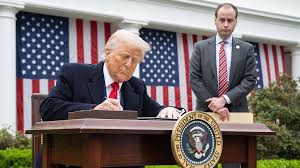What impact do global tariffs have on international trade dynamics? The imposition of tariffs by a nation can greatly reshape its trade relationships, and this was prominently demonstrated during the Trump administration. President Trump’s global tariffs, particularly on steel and aluminum, were initiated under the justification of protecting American industries and national security. However, this strategy sparked considerable debate regarding its broader implications on international trade.
Tariffs, fundamentally taxes imposed on imported goods, raise the prices of foreign products, making domestic goods more competitive. As a result, this can lead to a short-term boost for local manufacturers. Nevertheless, experts warn that tariffs can also provoke retaliation from other countries. For example, in response to the U.S. tariffs, nations like China and Canada enacted their own tariffs on American products, leading to a tit-for-tat escalation that disrupted global supply chains. As economists often note, “Trade wars can have unintended consequences that hurt both sides.”
Furthermore, the impact of these tariffs extends beyond immediate price changes. Tariffs can alter global market dynamics, shifting trade flows and creating new alliances. Some countries may seek alternative trading partners to avoid the burdens of tariffs, thereby realigning traditional economic relationships. The uncertainty created by such policies can hinder long-term investment decisions, as businesses become cautious about future trade conditions.
In terms of consumer impact, tariffs can lead to higher prices for everyday goods, as businesses pass on the increased costs to consumers. A report from the Federal Reserve highlighted that “American households could face considerable increases in prices due to tariffs.” This situation creates a paradox, where the very consumers that tariffs aim to protect may end up bearing the burden of increased costs.
Moreover, the broader implications on global politics cannot be overlooked. Tariffs can strain diplomatic relations, as countries may perceive them as aggressive economic maneuvers. The potential for conflict increases when nations view tariffs as tools of economic warfare. In this light, experts argue that a more cooperative approach to trade might yield better outcomes for global stability.














